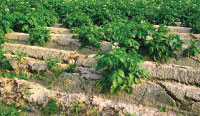
Features
Business
Policy
Eye on Potatoes: Learning from experience
Learning from experience
April 24, 2008 By Eye On Potatoes
Researchers believe Canada’s potato disease experiences could have applications across agriculture
By Dan Woolley
 |
| All of agriculture can learn from the Canadian potato industry’s experience handling recent disease outbreaks. |
The response of government policy makers to agricultural disease outbreaks can have adverse international trade consequences, something Canadian farmers know only too well.
Dr. Stephen Clark of Nova Scotia Agricultural College’s department of business and social sciences, recently presented his research findings on the policy consequences of disease outbreaks during a meeting of the world’s preeminent agricultural trade research organization – the International Trade Research Consortium – in Washington D.C. in January.
Dr. Clark and his NSAC colleagues looked at how governmental policy makers handled these outbreaks and the impact of their decisions on the export of farm commodities.
There has been a lot of press coverage about animal disease outbreaks – including Avian Influenza, BSE and foot and mouth – but there have also been trade disruptions arising from three potato disease outbreaks in Eastern Canada – potato virus Y (necrotic) in P.E.I. during 1989, potato wart in P.E.I. in 2000 and Golden nematode in Quebec in 2006 – in the past 20 years. Dr. Clark is particularly interested in how the U.S. government responds to potato diseases.
In 2006, the state of Idaho had an outbreak of potato cyst nematode (a potato disease similar to Golden nematode). Dr. Clark wonders if the U.S. government treated the Idaho potato growers the same way it treated Canadian potato producers. To him, the U.S. potato disease policies appear inconsistent, with the U.S. placing potato wart along with anthrax on its Select Agent List of diseases having the potential to be used as weapons by agro-terrorists. Potato wart is the only potato disease the U.S. has on its list but Dr. Clark believes PVYn is considered just as harshly by the Americans.
He also believes government policy makers can learn lessons from dealing with potato outbreaks that can then be applied to animal disease emergencies.
Dr. Clark and his research colleagues have identified two major issues arising from potato disease outbreaks. The group feels the issues have implications for other disease emergencies, as they impact international trade.
The first, he notes, is the development of “zone” policies to contain disease outbreaks.
“They asked ‘Why should all of Canada or Prince Edward Island be quarantined when these outbreaks are quite localized.’”
Trade officials at the World Trade Organization are currently discussing the idea of developing regions to deal with animal disease outbreaks and quarantines, explains Dr. Clark. Canadian officials are discussing their experiences with regional controls for livestock outbreaks in particular but not their experiences with potato diseases.
“Why are international agricultural trade officials ignoring the experience of disease outbreaks in potatoes when discussing agricultural trade and disease outbreaks? Where have you guys been all this time?” asks Dr. Clark, adding it may be because the potato industry is small and doesn’t get a lot of public attention.
“It certainly can’t be because the disease itself is considered of minor importance. Potato wart is considered to be a major threat to U.S. agriculture and is on its agro-terrorist disease list.”
The group’s second point is the importance of a processing sector in diminishing the impact of trade disruptions in agriculture from disease outbreaks. P.E.I. provides a good example of this according to Dr. Clark.
“The impact of the potato wart outbreak was less than that of PVYn because P.E.I. potato producers largely abandoned the seed potato market between the PVYn and potato wart outbreaks in favour of processing potatoes,” says Dr. Clark. “The shift from seed to processing potatoes was fuelled by an increase in processing capacity on the island during the last 15 years.”
This is a lesson other industries can learn from, he adds, using the example of BSE and the beef industry. “If there had been more processing capacity in Canada, the impact on the Canadian beef industry would have been less since there was only a partial ban on the processed product, whereas there was a total ban on the raw product.”
The P.E.I. potato industry now competes at a different level in the marketing chain, observes Dr. Clark, where value-added processing puts the industry at less risk of a potato disease disrupting its markets.
Prince Edward Island seed potato growers received governmental compensation following the PVYn outbreak and this could set a precedent for disease compensation payments. “This is really a hot issue (disease compensation) at the WTO because of the impact on agricultural trade,” says Dr. Clark, adding that is why he and his colleagues presented in Washington.
Print this page